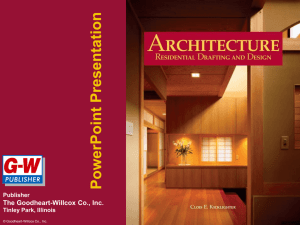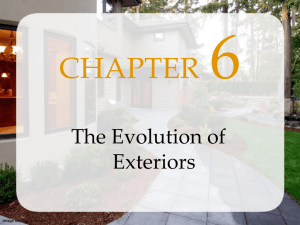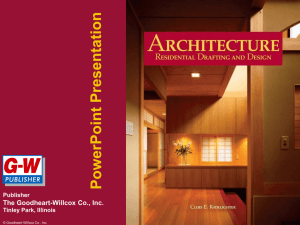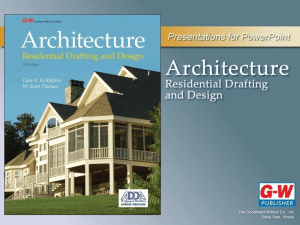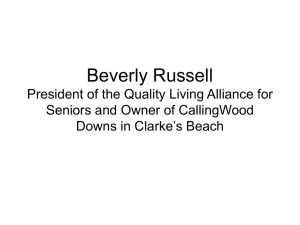Chapter 8: Room Planning
advertisement
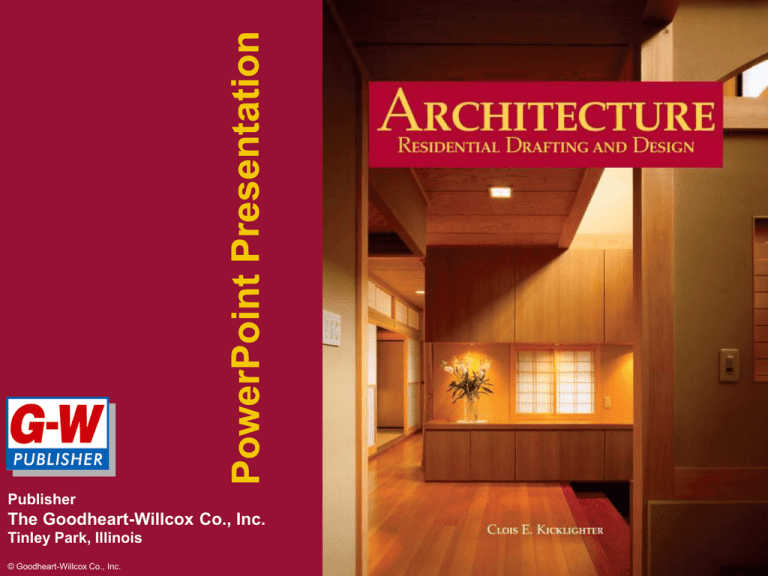
Publisher The Goodheart-Willcox Co., Inc. Tinley Park, Illinois © Goodheart-Willcox Co., Inc. 1 Permission granted to reproduce for educational use only Chapter 8 Room Planning— Living Area 2 © Goodheart-Willcox Co., Inc. Permission granted to reproduce for educational use only Chapter 8 Overview • • • • • • • • Introduction Designing with CADD Living Rooms Dining Rooms Entryway and Foyer Family Recreation Room Special-Purpose Rooms Patios, Porches, Courts, and Gazebos 3 © Goodheart-Willcox Co., Inc. Permission granted to reproduce for educational use only Learning Objectives • Identify the rooms and areas that comprise the living area. • Apply design principles to planning a living room. • Integrate the furniture in a living room plan. • Analyze a dining room using good design principles. (continued) 4 © Goodheart-Willcox Co., Inc. Permission granted to reproduce for educational use only Learning Objectives • Design a functional entry and foyer. • Communicate the primary design considerations for a recreation room. • Integrate patios, porches, and courts into the total floor plan of a dwelling. 5 © Goodheart-Willcox Co., Inc. Permission granted to reproduce for educational use only Living Areas • The living area is the most visible part of the house. – Comprises about 1/3 of the house. – The location of family gatherings. – For recreation, entertaining, and relaxing. – Not restricted to interior space. • Includes: – Living, dining, special-purpose, family recreation, and foyer. 6 © Goodheart-Willcox Co., Inc. Permission granted to reproduce for educational use only Living Areas (The Oshkosh, WI private residence of Chancellor Richard 7 H. Wells and family—formerly the Alberta Kimball Home) © Goodheart-Willcox Co., Inc. Permission granted to reproduce for educational use only Designing with CADD • CADD-generated rendering of a living area. (Helmuth A. Geiser, member AIBD) © Goodheart-Willcox Co., Inc. 8 Permission granted to reproduce for educational use only Designing with CADD • CADD-generated rendering of an exterior living area. (Helmuth A. Geiser, member AIBD) © Goodheart-Willcox Co., Inc. 9 Permission granted to reproduce for educational use only Living Rooms • Often the center of activity. • Lifestyle will determine the size and arrangement. • Illustration shows a conversation area. 10 © Goodheart-Willcox Co., Inc. Permission granted to reproduce for educational use only Formal Living Room 11 © Goodheart-Willcox Co., Inc. Permission granted to reproduce for educational use only Living Room Size • Small Living Room – 150 square feet or less. • Average Size Living Room – Around 250 square feet. • Large Living Room – About 400 square feet. 12 © Goodheart-Willcox Co., Inc. Permission granted to reproduce for educational use only Beauty and Charm (Manufactured Housing Institute) © Goodheart-Willcox Co., Inc. 13 Permission granted to reproduce for educational use only Average Size Living Room 14 © Goodheart-Willcox Co., Inc. Permission granted to reproduce for educational use only Large Living Room 15 © Goodheart-Willcox Co., Inc. Permission granted to reproduce for educational use only Size and Design Questions • • • • • What furniture is planned? How often will the room be used? How many people are expected? Is it a multipurpose room? Is the size in proportion to the rest of the house? 16 © Goodheart-Willcox Co., Inc. Permission granted to reproduce for educational use only Furniture Sizes 17 © Goodheart-Willcox Co., Inc. Permission granted to reproduce for educational use only Selecting Furniture • Specific furniture should reflect room use. 18 © Goodheart-Willcox Co., Inc. Permission granted to reproduce for educational use only Location of the Living Room • Do not use as a traffic corridor. • Raising or lowering the floor level discourages through traffic. • Set the living room off to the side. • Position room at grade level to connect with outside. • Take advantage of outside views. • Entrance should not be into the living room. 19 © Goodheart-Willcox Co., Inc. Permission granted to reproduce for educational use only Poorly Located Living Room 20 © Goodheart-Willcox Co., Inc. Permission granted to reproduce for educational use only Minimized Through Traffic 21 © Goodheart-Willcox Co., Inc. Permission granted to reproduce for educational use only Living/Dining Relationship • Dining and entertaining are closely related. • Locate living room and dining room close together. • May be combined. • Use an informal divider in place of a wall. • An open plan appears larger than a closed plan. 22 © Goodheart-Willcox Co., Inc. Permission granted to reproduce for educational use only Living Room Orientation • Consider maximum comfort and energy conservation. – In warm climates, use northern orientation. • Large windows and glass sliding door add spaciousness. • Walls should not be broken with too many small windows or doors. • The living room should be used. 23 © Goodheart-Willcox Co., Inc. Permission granted to reproduce for educational use only Living and Dining Combination 24 © Goodheart-Willcox Co., Inc. Permission granted to reproduce for educational use only Spaciousness Through Glass 25 © Goodheart-Willcox Co., Inc. Permission granted to reproduce for educational use only Living Room Decor • • • • • Should be exciting. Use color. Use texture. Hide weak points. Coordinate the interior and exterior decor. (Manufactured Housing Institute) © Goodheart-Willcox Co., Inc. 26 Permission granted to reproduce for educational use only Living Room Decor (Manufactured Housing Institute) © Goodheart-Willcox Co., Inc. 27 Permission granted to reproduce for educational use only Warm and Cool Colors (Manufactured Housing Institute) © Goodheart-Willcox Co., Inc. 28 Permission granted to reproduce for educational use only Average Size Living Room ` • Designed for conversation. 29 © Goodheart-Willcox Co., Inc. Permission granted to reproduce for educational use only Open Style Living Room 30 © Goodheart-Willcox Co., Inc. Permission granted to reproduce for educational use only Dining Rooms • Popularity of dining rooms changes from time to time. • Lifestyle determines the need for a dining room. • May be formal or informal. • Special place for eating and family gatherings. 31 © Goodheart-Willcox Co., Inc. Permission granted to reproduce for educational use only Formal Dining Room (NMC/Focal Point) © Goodheart-Willcox Co., Inc. 32 Permission granted to reproduce for educational use only Open Versus Closed Plan • Decide early whether the dining room will be open or closed. • A closed plan places the dining room in a cubicle. – Reduces overflow to other rooms. – House appears smaller and less dramatic. • An open plan enhances function and efficiency of the dining room. – Should be separated from the kitchen. 33 © Goodheart-Willcox Co., Inc. Permission granted to reproduce for educational use only Closed Dining Room Plan 34 © Goodheart-Willcox Co., Inc. Permission granted to reproduce for educational use only Open Dining Room Plan (Armstrong World Industries, Inc.) © Goodheart-Willcox Co., Inc. 35 Permission granted to reproduce for educational use only Open Dining Room Plan (Manufactured Housing Institute) © Goodheart-Willcox Co., Inc. 36 Permission granted to reproduce for educational use only Dining Room Size • Small-Size Room – About 120 square feet. – Seating for 4 to 6 people. 37 © Goodheart-Willcox Co., Inc. Permission granted to reproduce for educational use only Dining Room Size • Medium-Size Room – About 12' x 15'. – 180 square feet. – Seating for 6 to 8 people. 38 © Goodheart-Willcox Co., Inc. Permission granted to reproduce for educational use only Dining Room Size • Large-Size Room – 14' x 18' and larger. – 252 square feet. – Seating for 8 or more people. 39 © Goodheart-Willcox Co., Inc. Permission granted to reproduce for educational use only Typical Dining Room Furniture • • • • • Table Chairs Buffet China Cabinet Server or Cart 40 © Goodheart-Willcox Co., Inc. Permission granted to reproduce for educational use only Typical Dining Room Furniture 41 © Goodheart-Willcox Co., Inc. Permission granted to reproduce for educational use only Dining Room Arrangement • The dining room furniture arrangement depends on the room layout. • An outdoor vantage point should be considered when arranging furniture. • Orientation to other rooms should be considered. • Sufficient space should be provided between furniture. 42 © Goodheart-Willcox Co., Inc. Permission granted to reproduce for educational use only Dining Room Arrangement (The Oshkosh, WI private residence of Chancellor Richard 43 H. Wells and family—formerly the Alberta Kimball Home) © Goodheart-Willcox Co., Inc. Permission granted to reproduce for educational use only Furniture Spacing • The centerline of chairs around a table should be at least 2'-3" apart. • Provide ample space for serving. • Usually 2'-0" is sufficient space behind chairs. • Consider space for wheelchairs. • A minimum of 32" is needed to pass between obstacles. 44 © Goodheart-Willcox Co., Inc. Permission granted to reproduce for educational use only Location of Dining Room • The dining room should be adjacent to the kitchen. • It should also be adjacent to the living room. • Might be near the family room. • It should provide for the natural movement of guests. 45 © Goodheart-Willcox Co., Inc. Permission granted to reproduce for educational use only Location of Dining Room 46 © Goodheart-Willcox Co., Inc. Permission granted to reproduce for educational use only Location of Dining Room 47 © Goodheart-Willcox Co., Inc. Permission granted to reproduce for educational use only Dining Room Decor • The dining room decor should encourage a happy conversation time. • Controlled lighting is desirable. • The color scheme is usually the same as the living room. • Flooring should be durable. 48 © Goodheart-Willcox Co., Inc. Permission granted to reproduce for educational use only Lighting Focus (Focal Point, Inc.) © Goodheart-Willcox Co., Inc. 49 Permission granted to reproduce for educational use only Bright and Cheery Atmosphere (Armstrong World Industries, Inc.) © Goodheart-Willcox Co., Inc. 50 Permission granted to reproduce for educational use only Good Traffic Circulation 51 © Goodheart-Willcox Co., Inc. Permission granted to reproduce for educational use only Ideal Location 52 © Goodheart-Willcox Co., Inc. Permission granted to reproduce for educational use only Entryway and Foyer • Every house has at least one entryway. • Not all houses have a foyer. • There are three basic types of entryways: – Main entry. – Service entry. – Special-purpose entry. 53 © Goodheart-Willcox Co., Inc. Permission granted to reproduce for educational use only Variety of Entryways 54 © Goodheart-Willcox Co., Inc. Permission granted to reproduce for educational use only Main Entry • The main entry should be centrally located. • It should open into a foyer. • You should be able to view callers without opening the door. • Glass side panels provide visibility, natural light, and design feature. 55 © Goodheart-Willcox Co., Inc. Permission granted to reproduce for educational use only Main Entry (Photo Courtesy of James Hardie® Siding Products) © Goodheart-Willcox Co., Inc. 56 Permission granted to reproduce for educational use only Entryway Design Features • The entryway should provide protection from the weather using: – Wide overhangs. – Recessed entry. • It should be compatible with the overall house design. • It should provide enough space for several people. • Consider handicapped accessibility. 57 © Goodheart-Willcox Co., Inc. Permission granted to reproduce for educational use only Entry Protection 58 © Goodheart-Willcox Co., Inc. Permission granted to reproduce for educational use only Functional Entry 59 © Goodheart-Willcox Co., Inc. Permission granted to reproduce for educational use only Entry Doors • Good styling is important for main entry doors. • Should conform to the overall design. • Normally 3'-0" wide and 1-3/4" thick. • 34" minimum for a wheelchair. • Standard heights are 6'-8" and 8'-0". • Two doors add emphasis and function. 60 © Goodheart-Willcox Co., Inc. Permission granted to reproduce for educational use only Entry Doors 61 © Goodheart-Willcox Co., Inc. Permission granted to reproduce for educational use only Service Entrance • The service entrance is usually connected to the kitchen or utility room. (Therma-Tru, Division of LST Corporation) © Goodheart-Willcox Co., Inc. 62 Permission granted to reproduce for educational use only Special-Purpose Entries • Special-purpose entries provide access to patios, decks, and terraces. (Thermal Industries, Inc.) © Goodheart-Willcox Co., Inc. 63 Permission granted to reproduce for educational use only Foyer • A foyer functions as a place to greet guests and remove coats and overshoes. • Needs soil-resistant flooring materials. – Slate, terrazzo, ceramic or asphalt tile, or linoleum. – Needs a coat closet at least 2' x 3' inside dimensions. 64 © Goodheart-Willcox Co., Inc. Permission granted to reproduce for educational use only Foyer Materials 65 © Goodheart-Willcox Co., Inc. Permission granted to reproduce for educational use only Foyer Design • Should capitalize on the design aspects of the entryway. • Consider unity between the inside and outside. • Use planters or potted plants as informal dividers. • An open plan is more desirable. • Use mirrors to create an open feeling. • Consider lighting for effect and safety. 66 © Goodheart-Willcox Co., Inc. Permission granted to reproduce for educational use only Foyer Design 67 © Goodheart-Willcox Co., Inc. Permission granted to reproduce for educational use only Foyer Design 68 © Goodheart-Willcox Co., Inc. Permission granted to reproduce for educational use only Size of Foyer • The size of the foyer will depend on several factors: – Size of the house. – Cost of the house. – Location of the foyer. – Personal preference. – Minimum size is 6' x 6'. – Average size is 8' x 10'. – Large size is larger than 8' x 10'. 69 © Goodheart-Willcox Co., Inc. Permission granted to reproduce for educational use only Small Foyer Design 70 © Goodheart-Willcox Co., Inc. Permission granted to reproduce for educational use only Entry and Foyer Design 71 © Goodheart-Willcox Co., Inc. Permission granted to reproduce for educational use only Split-Entry Design 72 © Goodheart-Willcox Co., Inc. Permission granted to reproduce for educational use only Family Recreation Room • Purpose: To provide a place where the family can play or pursue hobbies. • Design for function. • Design for easy maintenance. • Can serve as an overflow space. • Locations: Near dining or living rooms, between kitchen and garage, adjacent to patios, or in the basement. 73 © Goodheart-Willcox Co., Inc. Permission granted to reproduce for educational use only Family Recreation Room • A recreation room such as this appears warm and inviting for relaxing family activities. (Photo Courtesy of Four Seasons Sunrooms) © Goodheart-Willcox Co., Inc. 74 Permission granted to reproduce for educational use only Family Recreation Room • The activities in this simple recreation room are focused around the entertainment center. 75 © Goodheart-Willcox Co., Inc. Permission granted to reproduce for educational use only Family Recreation Room • This family recreation room is located between the kitchen and garage. (The Garlinghouse Company) © Goodheart-Willcox Co., Inc. 76 Permission granted to reproduce for educational use only Recreation Room Design • Consider the number of people to use the room. • Consider the type of activity. • Size is related to furniture selection. • Common size is 12' x 20'. • Choose functional materials that are easy to maintain. • Choose bright colors. 77 © Goodheart-Willcox Co., Inc. Permission granted to reproduce for educational use only Basement Recreation Room (Formica Corporation) © Goodheart-Willcox Co., Inc. 78 Permission granted to reproduce for educational use only Recreation Room Design ` • For relaxing, reading, and writing. 79 © Goodheart-Willcox Co., Inc. Permission granted to reproduce for educational use only Recreation Room Design • For hobbies, work, and music. 80 © Goodheart-Willcox Co., Inc. Permission granted to reproduce for educational use only Recreation Room Design • For board games, singing, or conversation. 81 © Goodheart-Willcox Co., Inc. Permission granted to reproduce for educational use only Recreation Room Design • Functional furniture emphasizes the theme. (Wilsonart International) © Goodheart-Willcox Co., Inc. 82 Permission granted to reproduce for educational use only Recreation Room Design • Storage in the recreation room. 83 © Goodheart-Willcox Co., Inc. Permission granted to reproduce for educational use only Recreation Room Design • Creative decorating gives the recreation room life and excitement. (Formica Corporation) © Goodheart-Willcox Co., Inc. 84 Permission granted to reproduce for educational use only Recreation Room Design • Designed for conversation and reading. 85 © Goodheart-Willcox Co., Inc. Permission granted to reproduce for educational use only Recreation Room Design • Action room for young people. 86 © Goodheart-Willcox Co., Inc. Permission granted to reproduce for educational use only Special-Purpose Rooms • Home office, sunroom, music room, sunroom, computer room, etc. • May be part of another room. • May be located to the side or rear of the house. • Special-purpose rooms frequently have unique requirements: – Storage, lighting, ventilation, plumbing, and electrical. 87 © Goodheart-Willcox Co., Inc. Permission granted to reproduce for educational use only Special-Purpose Rooms • Home office space. (Sauder Woodworking Co.) © Goodheart-Willcox Co., Inc. 88 Permission granted to reproduce for educational use only Special-Purpose Rooms • Music room. (NMC/Focal Point) © Goodheart-Willcox Co., Inc. 89 Permission granted to reproduce for educational use only Special-Purpose Rooms • Sunroom. (Four Seasons Sunrooms) © Goodheart-Willcox Co., Inc. 90 Permission granted to reproduce for educational use only Special-Purpose Rooms • Storage space is a primary consideration. (Summitville Tile) © Goodheart-Willcox Co., Inc. 91 Permission granted to reproduce for educational use only Patios, Porches, and Courts • Patios, porches, and courts enlarge the area and function of a home. • For maximum effectiveness, they should be planned in the overall design. • Many people enjoy outdoor living. 92 © Goodheart-Willcox Co., Inc. Permission granted to reproduce for educational use only Outdoor Living Space • Deck. (Trex Co.) © Goodheart-Willcox Co., Inc. 93 Permission granted to reproduce for educational use only Outdoor Living Space • Patio. (Thermal Industries, Inc.) © Goodheart-Willcox Co., Inc. 94 Permission granted to reproduce for educational use only Patios • Patios are near the house, but not structurally connected to it. • They are located at grade level. • Commonly used materials: – Concrete, brick, stone, rot-resistant wood. • Patios are used for relaxing, playing, entertaining, and living. • Give consideration to the patio location. • Privacy: Screens, walls, and plants. 95 © Goodheart-Willcox Co., Inc. Permission granted to reproduce for educational use only Types of Patios • This patio is an extension of the living space. 96 © Goodheart-Willcox Co., Inc. Permission granted to reproduce for educational use only Types of Patios 97 © Goodheart-Willcox Co., Inc. Permission granted to reproduce for educational use only Types of Patios • Quiet, secluded patio. 98 © Goodheart-Willcox Co., Inc. Permission granted to reproduce for educational use only Types of Patios • Patio with a swimming pool. 99 © Goodheart-Willcox Co., Inc. Permission granted to reproduce for educational use only Porches and Decks • Porches and decks are different from patios in two ways: – Generally structurally connected. – Raised above the grade. • • • • Porches are covered . Decks are not covered. May function as outdoor eating areas. Balconies and verandas are types of porches that are higher. 100 © Goodheart-Willcox Co., Inc. Permission granted to reproduce for educational use only Porches and Decks • This enclosed porch is an excellent place to relax and enjoy a beautiful view. (Marvin Windows) © Goodheart-Willcox Co., Inc. 101 Permission granted to reproduce for educational use only Porches and Decks • This multilevel deck enhances the architectural design of the home. (Trex Co.) © Goodheart-Willcox Co., Inc. 102 Permission granted to reproduce for educational use only Porches and Patios • Covered dining patio-porch. 103 © Goodheart-Willcox Co., Inc. Permission granted to reproduce for educational use only Porches and Patios • This front entry porch is an integral part of the house. (Photo Courtesy of James Hardie® Siding Products) © Goodheart-Willcox Co., Inc. 104 Permission granted to reproduce for educational use only Courts • Courts are similar to porches and patios. – Totally or partially enclosed by walls or roof. – May be used for dining, relaxing, talking, or entertaining. – May serve as interior gardens. – May be used to break up the floor plan or provide interior light. 105 © Goodheart-Willcox Co., Inc. Permission granted to reproduce for educational use only Courts 106 © Goodheart-Willcox Co., Inc. Permission granted to reproduce for educational use only Gazebos • A gazebo is similar to a porch, but it is not attached to the house. It typically has open sides. 107 © Goodheart-Willcox Co., Inc. Permission granted to reproduce for educational use only Porch Application 108 © Goodheart-Willcox Co., Inc. Permission granted to reproduce for educational use only Patio Application 109 © Goodheart-Willcox Co., Inc. Permission granted to reproduce for educational use only
